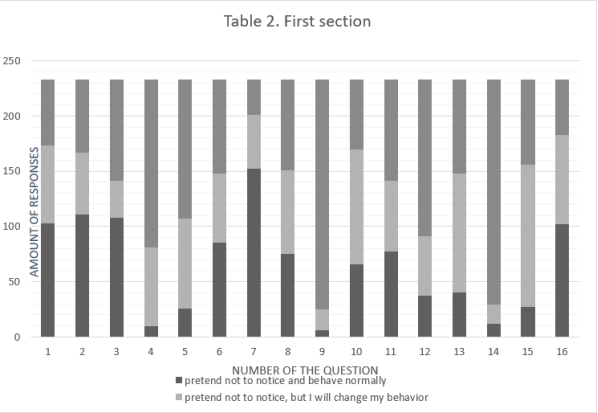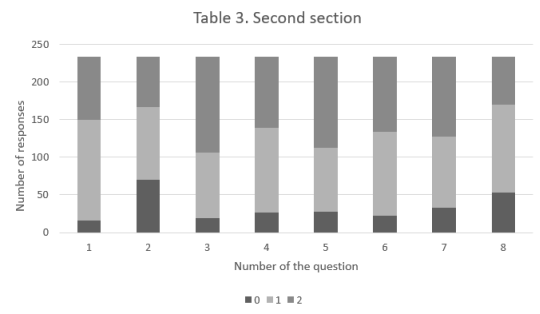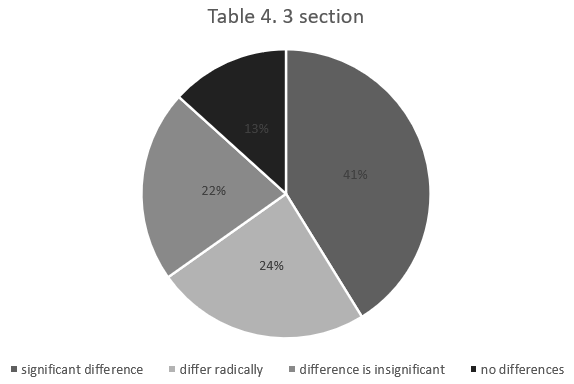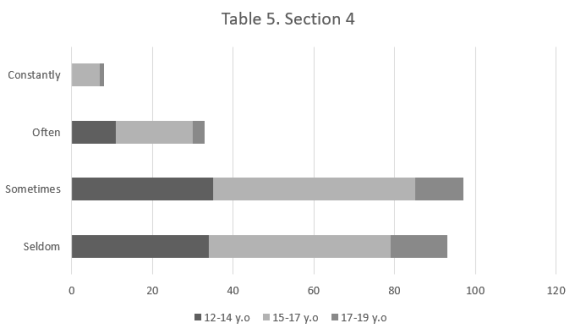Falsehood is one of the most controversial topics in the world of psychology. Therefore, there is a significant demand to investigate and deeply reflect on the impact of lying on a human's personality and its development. This study reflects the positive side of lying and deception, explains how young people can develop through it, and demonstrates the influence of collectivist society on the behavioral patterns of individuals. This issue was investigated by conducting online-survey with 233 adolescents and analyzing data. Thus, a great focus has been placed in this research on how often and why teenagers lie, how they react on situations when they become a spectator of a deceptive scene and how the youths develop their personality living through the falsehood in their families and outer environment throughout the childhood.
Keywords: deception, teenagers, self-knowledge, collectivist society, recognition of lie, untruthfulness.
INTRODUCTION
Deception is a common problem that everyone faces in life. It worries most people, and they try to understand its essence, the reasons that push others to lie, how to recognize a lie, and how to lie so that a person cannot be figured out. All these topics have been studied more than once by famous psychologists and scientists. Lying by teenagers is a separate category, which, perhaps, worries people no less than lying by adults. Parents are concerned about how to determine whether their child is lying and, if so, what makes him or her lie. The role of the environment in which the child has been raised is undoubtedly of great importance for the predisposition to deception. Social attitudes, cultural environments and parental upbringing differ in all countries, making it impossible to conduct a study that would be relevant to all. Therefore, this study is limited to a collectivist society and seeks to confirm the possibility of knowing oneself and knowing others through lying.
The scientific and practical significance of this study is that the possibility of knowing oneself through lying is still an under-researched area, which is what this study seeks to fulfil. Despite extensive, but insufficient research in the field of the psychology of lying and specifically the psychology of lying by children and adolescents, few have touched upon the topic of collectivist society and its influence on the child's subconscious, his personality formation, his own limits, and propensity to lie.
This research paper has been designed to seek answers to the following tasks:
1.Influence of lying environment on the formation of a teenager's personality.
2.Exposure to collectivist society as a crucial factor in the increasing tendency of deception among teenagers.
LITERATURE REVIEW
Falsehood is commonly understood as a purposeful distortion of the truth [S. Kuznetsov, 1998]. However, the opinions of many researchers, psychologists and philosophers differ when defining this concept in more details. This is partly due to the fact that truth is never really absolute and is made up of relative concepts [A. Alexeev, 2004]. P. Eckman [2003], an American psychologist, believes that lies can be divided into two types: reticence and distortion of the truth [p. 179–192]. However, there are many variations of classifications of lying: by severity, by motive, by manifestation, by recipient, even by the methods used in the process of communication [Charles W, 2013]. There’re states of falsehood: untruth is a statement that contradicts the truth, lie is deliberate misrepresentation of the truth, deception is information that would cause the recipient to draw the wrong conclusions [Gladkikh N., 2001].
Sometimes a liar is guided by selfish impulses, own benefit, some altruistic promptings [Chakhoyan A, 2017]. Talking about attitude to lying, some people treat lying positively or neutrally, morally justifying it and often resorted to using it [Y. Dergachev, 2019]. Sometimes distinguishing such concept such as lying for the good is an attempt to hide the truth out of good motives. Although Kant, for example, did not recognize such a term, because he believed that it is impossible to consider a lesser evil as good, just from the fact that it is less [Huseynov A, 2008]. Others, however, regard lying as a negative phenomenon. Therefore, they condemn it and try to avoid it. Despite the different attitudes to lying in different people depending on gender, nation, religion, political views, economics professor Dan Eriely [2012] demonstrated through a series of experiments that Dr. House was right and in one way or another all people lie [p. 3].
A person learns to lie after the age of four, according to the UNICEF article «Why do children lie?", it is at this age that imagination begins to form. The brain begins to build logic chains from cause to effect, and a child's personality develops. Children of this age and older can distinguish fiction from truth and generate their own fantasies. What prompts children to lie at such a young age? Mostly, of course, it is the child's environment. Often the behavior of parents or peers forces the child to resort to dishonesty. He or she is greatly influenced by the opinion of society and its attitudes [Nikolaeva E, 2011]. By succumbing to them and getting into an uncomfortable situation, a person tries to adjust and one of the ways of adaptation is deception [Akimenko A, 2010]. Self-preservation instinct [Khazova S. A., 2016], fear of punishment or desire to improve/form a certain opinion about oneself in others can become a motive. Strictness of parents and teachers forces a child to lie about why he/she did not do his/her homework or got an F. Peer bragging encourages a child to embellish and exaggerate his own stories and accomplishments. Often the need to obey parents and the desire to create a certain image in the eyes of friends are in opposition to one another, forcing to make a choice [p. 416–417]. And since adolescents are not always able to properly prioritize and evaluate the consequences of certain actions, they tend to make a wrong choice in this dilemma.
Every person depends to some extent on an attitude of society toward him or her [The Influence of Society on Person, 2014]. There is such a concept as collectivist society. It multiplies a person's dependence on public opinion. Collectivist society is a group where the interests of a society are more significant than those of an individual. Examples of such a society are such countries as Russia, Kazakhstan, Korea, Venezuela, and others [Piskorskaya E., 2013]. The importance of society in the life of each person there is greatly exaggerated [Irwin A, 2000]. Undoubtedly, collectivism gives community, but also puts enormous pressure, forcing sometimes to cheat and adjust [Berdyaev N. quoted by Tsvyk V., 2019]. Being brought up in such an environment, a teenager learns to assert personal boundaries and follows them not always in honest ways [P. Ekman, as cited Gladkikh N., 2001].
People from their early childhood in this kind of environment form an attitude that the majority’s opinion is ultimately correct, and it is necessary to abide it, otherwise you get a reprimand or a punishment. Without rethinking this directive in their adulthood, a person continues to subconsciously follow it [Gubanov N., 2014, p.88, Zakharova O, 2017]. Being afraid to earn the condemnation of the public, children often lie in adolescent hood, and it becomes a habit, becoming a kind of protective mechanism. As a worsening factor we can consider a formal negative attitude to lying in most of above-mentioned countries. That is, by distorting the truth to avoid punishment for any action, a teenager drives himself into an even more psychologically traumatic situation. Discovery of deception scares a teenager not only by its punishment, but also by a loss of parents' trust. This, in turn, causes him or her to lie again [pp. 72–74].
However, to our opinion lying can be seen not only in a negative way, for it also contributes to personal development of intelligence and self-knowledge.
The intellect, as a means of preserving an individual, develops its chief powers in pretense; for it preserves the weaker and more defenseless individuals who cannot defend themselves in a struggle for existence with horns or teeth. In a man this art of pretense reaches its pinnacle through certain ways. There is a deception, a flattery, lying, secret backbiting, posturing, a life full of borrowed glitter, a habit of disguise, conventionality, acting out comedies to others and to oneself [Nietzsche, F. 1994].
The fact, that we can treat deception positively, led us to believe that lying can help adolescents get to know themselves better.
RESULTS
To investigate the use of lying as a way of knowing oneself in adolescents, we conducted a survey. Unfortunately, due to the COVID-19 pandemic and quarantine measures, it was not possible to conduct interviews to avoid contamination, so we conducted an online survey, but luckily increased the coverage.
Age category from 12 to 19 has been chosen to be observed because it best fits the definition of «adolescent” and it is the impact of lying on the development of teen personality that is little researched now, but the issue remains relevant. The survey has obtained information on 233 respondents, of whom 33.4 % are 12 to 14 years old, 52.8 % are 15 to 17 years old, and 12.9 % are 17 to 19 years old. Of these, 56.2 % are females, 40.8 % are males, and another 3 % do not want to indicate their gender (Table 1).
Table 1
Respondents’ age groups
|
Male |
Female |
Don’t want to response |
Total |
|
|
12–14 |
35 |
45 |
0 |
80 |
|
15–17 |
44 |
73 |
6 |
123 |
|
17–19 |
16 |
13 |
1 |
30 |
|
Total |
95 |
131 |
7 |
233 |
These respondents fully meet the necessary criteria for further analysis of attitudes toward lying, reactions to it, and motives for deception, which makes data reliable and valid.
All questions in the first section are designed to determine respondents' attitudes toward lying to people of varying degrees of intimacy and tendency to encourage reticence/untruthfulness. They explore how collectivism affects perceptions of lying, and how strong a role relationship with people plays when the interviewee is confronted with an attempt to deceive them. The questions can be divided into three categories:
— lying by strangers to/about strangers (1, 7, 16)
— strangers' lies to/about close people to respondent (9, 11, 14)
— lying by strangers to/about respondent (2, 3, 4, 5, 6, 8, 10, 12, 13, 15)

The questions in the first group averaged a loyal response. Most people chose the answer option “I'll pretend I didn't notice anything, and I'll behave normally”. Almost as often people had a neutral attitude toward what was going on, witnessing the deception of people quite unrelated to them. Negative and radical reactions were quite rare. Questions in one way or another about the deception by outsiders of those close to the interviewee showed strong negative reactions. Teenagers tend to expose lies if they concern relatives and friends. Also, if a stranger tries to deceive the respondent, he or she will also try to make it clear that he or she has caught the untruth. The questions in the third group showed the most neutral reaction. The person reacts to the attempt to deceive him, as a result of which he changes his behavior, but does not make it clear to the liar that his deception is exposed.
The second section of questions was designed to obtain numerical data and to determine what, according to the interviewees, are the most frequent reasons for deception. Interviewees were given a list of reasons, such as «not to spoil the impression of myself”, «to avoid punishment”, «to protect loved ones” (see details in the attached survey) and were asked to rate on a scale of 1 to 3 how often a particular reason causes people to lie, where 1 is very rarely and 3 is often. Most reasons were rated as being used with an average frequency (2): creating a certain impression of oneself, maintaining certain relationships, protecting personal space, and lying out of one's own delusions. The following reasons were rated as «frequent”: protection from punishment or protection of loved ones from unwanted truth, unwillingness to disappoint them, fear of condemnation by society.

The final section with questions is necessary for the self-assessment of respondents. They were asked about the subconscious differences between “deceit”, “lie”, and “untruth”. The survey aims to find out how obvious to them the distinction of these names in practice, as well as how aware they are of the linguistic differences between these words. The majority (41.2 %) felt that there is still a significant difference, but it is not so categorical. 24 % of respondents concluded that these words differ radically, 21.5 % are sure that the difference is insignificant. The remaining 13.3 % think there are no differences between the above-mentioned concepts.

The next question of the third section is of a high interest to our research and is necessary for the possibility of self-determination and estimation of own frequency of lie use in everyday life, and then it was offered to choose the most frequent reasons for it.
40.3 % of respondents rarely use lying (less than twice a week), 42.1 % resort to lying two to three times a week, 14.2 % lie often (four to seven times a week) and 3.4 % do it constantly. The reasons for misleading others were the same as in the second section with the following rates of preference — to avoid punishment (44.6 %), to create a good impression about oneself (19.3 %), to protect relatives from unwanted truths (46.8 %), to defend personal space (42.5 %), to avoid facing the disapproval of society (38.2 %). But there were also new reasons such as to benefit from a person or situation (21 %) and to get pleasure from outsmarting someone (8.6 %), in order not to waste time (0.4 %), as a joke (0.4 %), because of a changed opinion over time (0.4 %). Other answers were also received from the respondents, but all of them can be categorized into the following categories without any inaccuracies.

DISCUSSION
For the most part, respondents give a loyal, and if not encouraging, then not condemning reaction when the question comes about lying to people not close to them. When they are clearly aware that the information given to this person is a lie, they take it calmly and are likely to stay aware of the reasons for what is going on. In part, they do so because they are driven by the same motives. Then the question arises, how often do they react negatively if their motives are not close to them or are incomprehensible? The survey shows that reactions to deception depend directly on the person they are trying to deceive. The closer the respondent is to a person being deceived, the more willing a respondent is to interfere into a process. Thus, when asked about classmates or acquaintances, teenagers mostly responded that they would not react in any way to the deception going on in front of them, but if a victim were a friend or relative, the respondent would immediately give up the deception. This indicates the importance of society in the minds of respondents and confirms the hypothesis about the influence of a collectivist society on the frequency of lying. In a collectivist society, the role of the family is elevated to an absolute, and family relationships assume unconditional trust (which, however, is not always abided by a child due to the high pressure and often lack of personal space). It explains the results of the second category questions from the first section: questions 9, 11 and 14 received the most negative reactions. This means that in situations which somehow involves lying from a loved one or lying to a loved one, a respondent considers it necessary to denounce deception, because at a subconscious level, even though he/ she understands that everyone lies, he/she believes that honesty is something unconditionally obligatory. A child who has been brought up in an atmosphere that obliges him to be honest with his\ her relatives has a dissonance in his\ her head and a desire to deny lies. When he\ she begins to think about his\ her boundaries, which, in fact, were set for him in childhood, if not deprived of them at all. This is where a child's journey of self-discovery through lies begins. He determines his\ her own boundaries of what is permissible. This can be seen from questions in the second and fourth sections where the interviewee determines what he or she thinks is the most likely reason for lying. However, since most people judge others by themselves, he relies on his own feelings. What he considers an acceptable reason for lying, he cites as the most likely or at least one of the possible reasons. By defining a framework for others, an adolescent builds his or her own boundaries of what is acceptable. This is reflected, for example, in the results of Section 4, where most respondents indicated a significant difference between the terms denoting deception. Consequently, one or another variation corresponding to the type of deception is perceived differently by each respondent. This may have led to a particular response to the question about the frequency of lying. From table 4 above, we can see how respondents themselves rate how often they are resorted to using lies in their everyday lives.
CONCLUSION
Currently, the issue of adolescent lying is still relevant and alarming for both parents and psychologists. Information about the possibility of self-knowledge through lying, as well as about the influence of a certain environment will be very useful for novice psychologists and caregivers, parents, educators. This study was aimed at finding out the possibility of teenagers to know themselves, their limits through lying, as well as to show how lying contributes to mastering the communication skills between teenagers and those around them. The study revealed the influence of a collectivist society on the frequency of lying by teenagers and their motivations as well. The structured interviews were conducted and provided considerable data to answer all research questions.
To conclude, recommendations for further research on adolescents' deception include conducting an interview or experiment for clearer and more reliable results, investigating among a greater number of participants, and including side-effecting details such as type of family of each teenager, his\her area of interests (for instance media content he\she is consuming every day). We believe that these results could serve as a good basis for additional research with interviews to make sure that adolescents were not trying to demonstrate socially expected outcomes. Already the results look realistic and reliable, showing a plausible picture, but perfection is not unreasonable.
References:
- Dushina, E. A. Peculiarities of attitudes towards lying among modern schoolchildren / E. A. Dushina. — Текст: непосредственный // Институт Молодежи. — 1999. — № 15. — С. 24–26.
- Irgit, E. L. THE INFLUENCE OF LIE TO THE FORMATION OF ADOLESCENTS’ MORALITY / E. L. Irgit, S. P. Kalsina. — Текст: непосредственный // ВЕСТНИК Педагогические науки. — 2013/4. — С. 73–74.
- Paul, Ekman Telling Lies: Clues to Deceit in the Marketplace, Politics, and Marriage / Ekman P. — Текст: непосредственный //. — 2003. — С. 179–192.
- Kovalenko, M. A. Psychological aspects of adolescent lying / M. A. Kovalenko. — Текст: непосредственный //. — 2015.— С. 1.
- Ekman, P. Why Kids Lie / P. Ekman. — Текст: непосредственный //. — 1989. — С. 86–89.
- Дупак, А. А. Личностные детерминанты склонности ко лжи / А. А. Дупак. — Текст: непосредственный // Молодой ученый. — 2013. — № 3 (50). — С. 430–433
- Губанов, Н. И. Истина и ее критерии / Н. И. Губанов, Н. Н. Губанов, А. Э. Волков. — Текст: непосредственный // Вестник Тюменского государственного университета. — 2014. — № 165. — С. 84–92.
- КЛАССИФИКАЦИИ ФОРМ ЛЖИ: ПАРАМЕТРЫ И ОСНОВАНИЯ / Чахоян, С. А, Назаров, И. В. — Текст: непосредственный // Перспективы психологической науки и практики. — 2017. — №. — С. 403–407.
- Гладких В.Н. Ложь и двусмысленность / Гладких, В. Н. — Текст: непосредственный // ЭКО. Экономика и организация промышленного производства. — 2011. — №. — С. 169–180.
- Акименко К.А. Стратегии адаптивного поведения студенческой молодежи и их характеристика / Акименко, К. А. — Текст: непосредственный // Психология развития. — 2014. — №. — С. 1.







